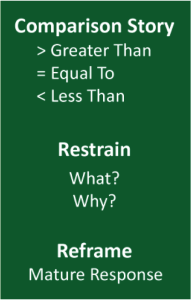Rudy Story
Several years ago I had the opportunity to facilitate an interactive leadership learning experience for about 120 college student leaders in Iowa. Following my part, Daniel Eugene Ruettiger, otherwise known as Rudy, took the stage to inspire the students with his determination-to-succeed Norte Dame Football story. As I listened to Rudy, I couldn’t help but compare myself to him. I evaluated his presentation style, content, and skills to mine. I even found myself thinking of how much money he was getting paid compared to my compensation. The comparison story I was telling myself was not good as it was filtered through my own pride, selfishness, and competitive nature.
Comparing
The comparison story is another type of story we tell our self. We see someone doing something or  having something that relates to us in some manner, and then we start comparing. We compare titles, status, knowledge, skills, children, money, physique, and stuff (houses, cars, phones, computers, etc…). It is actually almost impossible not to compare at some level, especially if it is something important to us.
having something that relates to us in some manner, and then we start comparing. We compare titles, status, knowledge, skills, children, money, physique, and stuff (houses, cars, phones, computers, etc…). It is actually almost impossible not to compare at some level, especially if it is something important to us.
Yet this story of comparison, if not restrained or framed properly, can cause us to think, feel, and behave in ways that can negatively impact relational trust which is a foundation to effective leadership. Some of these negative behaviors may include withholding information, demonstrating superiority, demeaning others, acting as a victim, or withdrawing. Thus, if we desire to lead with confidence and thoughtfulness, it is critical to recognize, restrain, and reframe our comparison stories.
Recognize
As we compare, we put our self in three different buckets. We see our self as less than, equal to, or greater than the other person. Yet, why do we compare our self with others? This is an important question that has many answers. We compare to validate our self, feel important, confirm our identity, evaluate choices, and learn.
The answer to this question is also rooted in our emotional state at the moment of comparison. If pride, jealousy, or feelings of worthlessness are being stirred by the comparison, our response will be much different than if our emotional state is one of humility, concern, or appreciation. The important factors are to recognize that we are comparing, to understand our emotional state in the moment, and to clarify why this comparison is happening.
Restrain
Have you ever heard anyone say, “I want to follow a jealous or prideful person”? Probably not. Yet many of the immature behaviors that show up from comparison are rooted in jealousy and pride. For example, a peer receives a promotion that you wanted. Immediately, you make a comparison. An immature response is to complain, slander, or make up excuses.
- “I can’t believe he got the promotion. This is another example of incompetent decision makers.” (Complaint)
- “Well, she must have brown-nosed her way into the role.” (Slander)
- “I would have had that promotion if I had not been ill for two weeks during the big client presentation.” (Excuse)
The challenge of the comparison story is to not go down the immature path of behaviors that are motivated by our own insecurities and defensiveness. Pausing to recognize our own emotional state, motives, and natural reactions will help us make better choices so we will respond in a mature manner. Reframing our thinking will help us respond appropriately.
Reframe
If the comparison story we tell our self is reframed in a mature response, there is the opportunity to actually help our self and influence others in a positive manner. For example, let’s say I compare myself as greater than someone else in a particular skill. An immature response is to boast. This may be driven by pride or insecurities. I have to boast to continue to make myself look good in order to maintain the identity I have created for myself of feeling superior. Reframing this comparison in a mature manner is to be grateful for the skills and internally recognizing the people that helped me develop these skills. The response might then be to help others develop this skill.
Here is another example. Imagine comparing yourself to someone else in terms of a position in which you view yourself as less than. An immature response might be to distance yourself, view yourself as less than, or even find the things wrong with this person to lower his status in your mind. Reframing to a mature response would be to recognize this person as a fellow human being with valuable skills. This might cause you to reach out to this person, build a stronger relationship, and possibly learn something from them.
There are multiple ways to reframe the comparison stories you tell yourself. The challenge is to first recognize the comparison and why you are comparing. Second, it is critical to restrain the response so immature words or behaviors do not emerge that will damage your influencing capacity. Finally, discover the mature response by reframing the comparison to a mature response that will benefit you and others.




